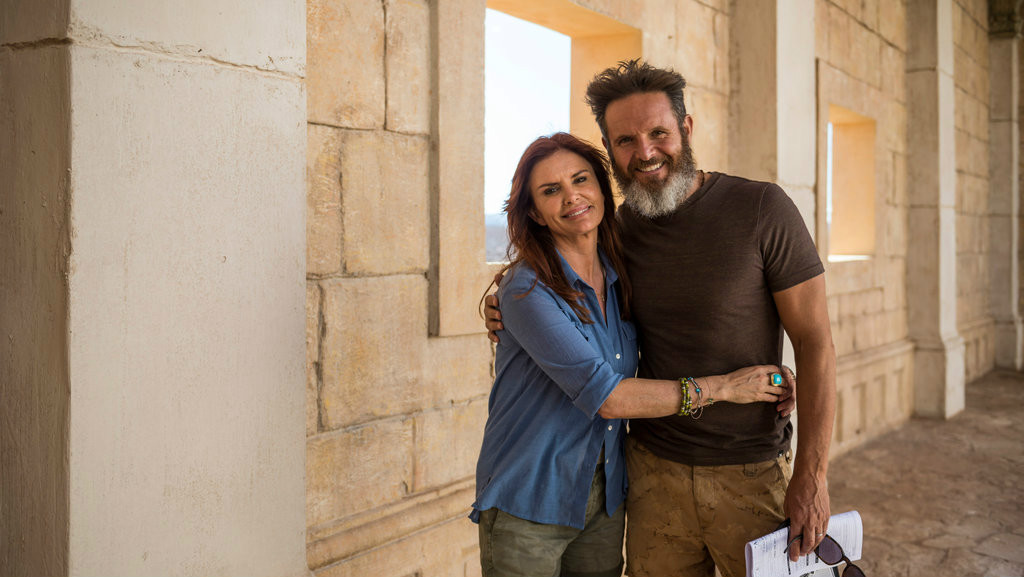This Easter debuts the follow-up to Mark Burnett and Roma Downey’s record-breaking History Channel series The Bible. Chronicling Jesus’ resurrection and the early church in Acts, A.D. The Bible Continues offers powerful lessons for today’s church, the Christian husband-wife producing team told CT in an interview.
More than 13 million viewers watched The Bible in 2013, and the movie adaptation of the series, Son of God, grossed nearly $60 million, corresponding with a wave of Bible epics at the box office.
Why did you feel like now was the right time to adapt this story?
Downey: What we hope to do with A.D. The Bible Continues is to take a deeper dive into the book of Acts so we can really explore the stories and really dig deeper into the characters. You’ve got to remember they didn’t know they were characters in the Bible, but rather were people like you and me struggling with the things that we struggle with.
…We cast an amazing international group of actors who bring racial diversity and emotional intensity so that we can present this story in a gritty and realistic way that feels authentic. We in no way wanted this to feel corny, or that you were seeing something from Sunday school, but rather that you were tuning into the emotional and exciting hour of drama. We worked with scholars and theologians to make sure that when we get Scripture into this that we do so accurately.
This first season of A.D. will take us through chapters of 1 through 10 from the book of Acts but we also draw from history and the writings of Josephus at the time, because it’s important to set a political context for the story so the audience can understand what was going on in Judea at that time.
Acts, in many ways, is the story of a persecuted church. Where did you see parallels between persecution today and that of the first century?
Downey: I think the parallels are obvious, and it’s with heartbreak that we watch the news coming out overseas . We are surprised at how little news there is really in this country about what is happening over there. You can see that 2,000 years have passed and many things have changed but tragically some things have not changed. I think it’s up to us, the American Christians, to speak up and speak out and speak loudly, that this cannot happen.
Our story takes us on the journey of those dark days after the death of Jesus, when fear and confusion reigned for the disciples and danger lurked down every alleyway. We know the Roman occupation was cruel and severe, led by Pontius Pilate. We see the also the political maneuvering of the temple authorities and that struggle for power led by Caiaphas. We show you the struggle for freedom by taking up arms as expressed by the zealots and then, of course, at the center of it at all, we have the disciples and the early believers navigating through the dangerous days and waiting for the Holy Spirit to come.
What do we learn from the characters?
Burnett: God never gives up on us. People make mistakes over and over but it’s the people who make the biggest mistakes or who take the wrong path, who end up becoming so important to all of us. In A.D., Peter denies Jesus three times. Saul was the biggest persecutor. One let down his best friend and his Lord and still got the same charge and one was the biggest persecutor and ended up writing more of the New Testament and traveling further spreading the word.
Downey: Also, you see in the first episode, Mary Magdalene going up through the tomb, and you’re reminded that it was a woman to whom Jesus first appeared when he resurrects. That scene never ceases to move me when we see her confused and fearful at first, thinking they have stolen Jesus’ body and then there he is and what an honor for her to have been the very first person and for it to be a woman.
The early church struggled throughout with balancing diversity and unity. What are some lessons you learned about those two themes from the book of Acts?
Downey: Certainly we have reached out across the Christian community, across denominations, and found that there is a beautiful opportunity for bridge building, particularly when we gather around issues like what is happening to our brothers and sisters overseas. We are many in number.
If you look at A.D., the church started with 11 remaining disciples and a handful of early believers and it grew and it grew. We are more than two billion people today and when we stand together with the strength of our numbers and our shared belief that Jesus is the son of God, I think that we can do anything and with concerns to these larger issues happening in the world, we must stand together.
Do you worry that there may be fatigue from so many Bible-based films and shows?
Burnett: Nope. In the same way I don’t think there is any new fatigue as far as planting new churches. It’s a supernatural thing, and it’s part of the plan. I can’t imagine any Christian being fatigued by hearing his Word.









